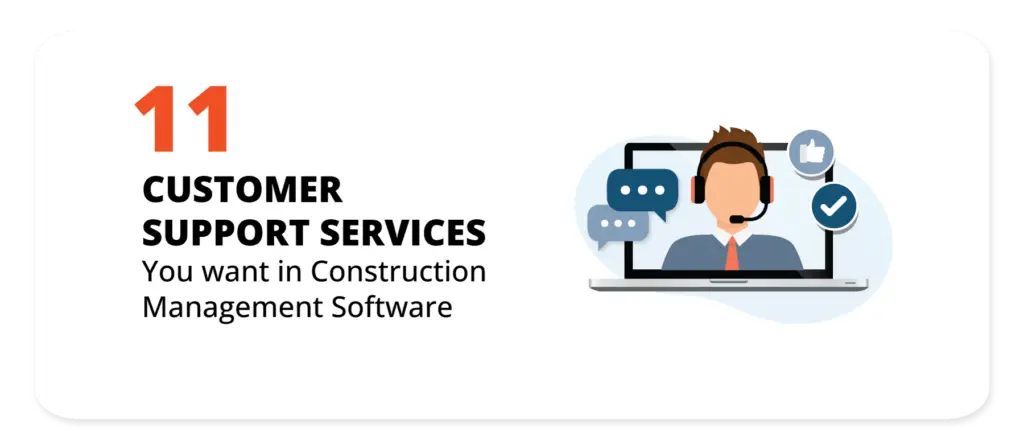
Selecting the right construction management software is a multi-faceted decision, requiring evaluation of key features like scalability, integration capabilities, and the ability to offer a comprehensive solution for your business’ needs. However, one crucial aspect that often goes overlooked by construction professionals when choosing construction management software is the quality of customer support services.
Imagine this: you’ve invested in what seemed like the ideal construction software, only to find yourself stranded with the frustration of navigating poor customer service, ineffective solutions, and wasted time seeking support on critical software issues. This scenario is more common than you might think — two-thirds of consumers report that the most frustrating aspect of getting customer service is waiting on hold or having to explain the same information to multiple representatives.
The truth is the effectiveness of customer support services can make or break your entire experience with construction management software. It’s not just about having assistance available post-purchase; it’s about how effectively a software provider can understand your business’ evolving needs, support your onboarding requirements, and help you improve your business workflows and processes.
In this blog, we delve into the critical customer support services — both before the software launch and after the implementation — you should evaluate when choosing construction management software, and how they contribute to the overall success and efficiency of your construction projects.
Customer Support Services to Consider Prior to Launching Construction Management Software
Implementing construction management software often involves navigating complex software functionalities and aligning them with project requirements. Amidst the pressure of project deadlines and operational intricacies, the role of a proficient customer support team becomes indispensable in facilitating a smooth onboarding process. Here, we delve into the essential traits and capabilities of a customer support service that can enhance your software implementation journey:
1. Assessment of Training Programs
To ensure your team can fully understand and leverage the capabilities of construction management software, assess that the training aligns with your team’s needs and the specific demands of your business. The right training program empowers your staff to utilize the software to its fullest potential, enhancing the efficiency and productivity of your construction projects. When evaluating the training support offered by your software provider, consider the following key questions:
- What types of training formats (webinars, in-person sessions, or online tutorials) are available, and how do they align with your team’s learning preferences and schedules?
- Can the training be customized to focus on the software features most relevant to your specific business operations?
2. Consultant Expertise
The expertise of consultants play a critical role in the successful implementation of construction management software. Their deep product knowledge and industry insights are invaluable for aligning the software training with your current operational needs, thereby maximizing the software’s contribution towards improved project efficiency. As you evaluate potential software options, consider these essential questions:
- What level of industry experience do the consultants have to be able to understand your unique business needs?
- Can you gather examples or case studies demonstrating how the consultants have successfully adapted the training to suit the unique workflows of similar businesses in the construction industry?
3. Project Management and Execution
A skilled project manager bridges the gap between the software’s capabilities and your team’s operational needs, ensuring that the transition to the new system is seamless and efficient. They monitor the implementation progress and help you maintain your project momentum and avoid operational disruptions. As you evaluate your options for construction management software, reflect on these key questions to determine the effectiveness of the project management and execution strategy:
- How will the project manager coordinate with your team to ensure a smooth software implementation?
- What strategies does the project manager employ to manage and mitigate potential challenges during the software implementation process?
4. Communication Strategies
Clear, ongoing communication between your team and the software provider ensures that both parties are aligned on expectations, timelines, and any changes that may occur during the implementation process. This coordination is vital to pre-emptively address any issues and maintain a steady workflow. Here’s what to consider when assessing the communication strategies of your potential construction management software provider:
- What communication channels (emails, meetings, calls) does the provider use to keep in touch with your team during the implementation process?
- How will the software provider ensure that all your team members are kept informed and involved throughout the implementation phase?
5. Contingency Planning
It’s essential to anticipate and prepare for potential setbacks that might arise during a software rollout. Effective contingency planning ensures that your business remains agile and responsive, minimizing disruptions to your operations. Seek answers to these essential questions to understand the measures your software provider has in place for such scenarios:
- What measures are in place to follow the strict timeline for the overall execution of the construction software?
- What contingency plans are in place if the software implementation encounters unforeseen delays?
Ongoing Customer Services After Construction Software Implementation
Once your construction management software is up and running, ongoing support and maintenance become pivotal for uninterrupted operations. A robust customer support system ensures that any post-launch issues are promptly addressed, and timely communication of software updates keeps the software up to date and in sync with evolving industry needs. Let’s explore key areas of post-implementation customer support services that you should consider while choosing construction management software:
6. Knowledge Base and Resources
A comprehensive knowledge base serves as a self-help resource, enabling your team to troubleshoot and resolve common software issues independently. This empowers your team and reduces dependency on external support for minor queries. Here’s what to check with your construction management software provider:
- Do they offer comprehensive training documentation with easy-to-follow guides and tutorials?
- How frequently is the knowledge base updated, and does it include resources for troubleshooting common issues?
7. Ongoing Training and Education
Consistent training and education are crucial for ensuring your team can fully utilize all features of the software, especially as new updates and functionalities are introduced. Regular training sessions help your team stay up-to-date and proficient, maximizing the software’s benefits for your business. Key considerations include:
- Are regular updates and training sessions provided for new features and system enhancements?
- How does the software provider ensure users stay informed and proficient with evolving functionalities?
8. Dedicated Support Team
A dedicated support team offers personalized assistance and helps resolve issues more efficiently due to their familiarity with your business and its unique requirements. This consistent support is vital for maintaining software efficiency and addressing specific software challenges your business may encounter. Key questions to ask are:
- What is the structure of the dedicated support team, and how does it cater to software-specific issues?
- Is there a consistent point of contact within the support team who understands your business’s history and needs?
9. 24/7 Accessibility
In the construction industry, where work often extends beyond standard business hours, having access to 24/7 support is essential for addressing critical issues swiftly and avoiding operational downtime. When committing to construction software, assess the following:
- Is there round-the-clock support available for critical software issues, and how is it accessed?
- What are the response times for support queries outside of standard business hours?
10. Community Engagement and Networking
Fostering a sense of community and enabling networking opportunities among clients provides a well-rounded customer support experience. Such platforms not only offer a space for problem-solving but also for exchanging industry insights and best practices. When evaluating a construction software provider, it’s important to consider:
- Does the software provider offer an online forum or platform (such as user conference, or webinars) for users to discuss, exchange ideas, and share best practices?
- How actively does the provider facilitate community engagement among its users to promote collaborative learning and networking?
11. Feedback Mechanism and Continuous Improvement
An effective feedback mechanism is crucial for any construction management software, as it directly influences its evolution and adaptation to user needs. A provider that actively listens to, and implements user feedback demonstrates a commitment to continuous improvement and customer satisfaction. When evaluating a construction software provider’s post-implementation support, consider these important questions:
- How does the software provider collect user feedback, and what channels (surveys, forums, direct communication) are available for users to share their insights and suggestions?
- Is there a transparent process in place for how user feedback is evaluated and incorporated into future software updates and improvements?
Access Superior Customer Support with Jonas Construction Software
At Jonas Construction Software, we understand that selecting the right construction management software is just the beginning. Our commitment to your business success extends far beyond the initial software launch. We provide an array of customer support services to ensure a seamless software experience, both before and after implementation.
Our Project Managers act as navigators, leading you through the implementation process. As your primary contact, they manage milestones and oversee the training progress, guaranteeing a smooth and timely setup.
Our Consultants are at the forefront, delivering extensive process training tailored to your team’s needs. They ensure you are well-prepared as you transition to the new system, offering live training and ongoing support every step of the way.
The Account Portal places control and visibility at your fingertips. Track your progress, access detailed implementation phases, and utilize an efficient channel for service requests and inquiries, all within an intuitive interface.
After implementation, the Client Portal users can access an extensive collection of training videos and knowledge base resources to enhance your team’s learning experience.
Click HERE to learn more about Jonas’ integrated construction management software and how we can help unify your field and back office operations to protect your profits and maximize operational efficiency. Backed by a comprehensive customer support framework, Jonas strives to make the transition and continuous use of our software a streamlined and positive experience for your business.







